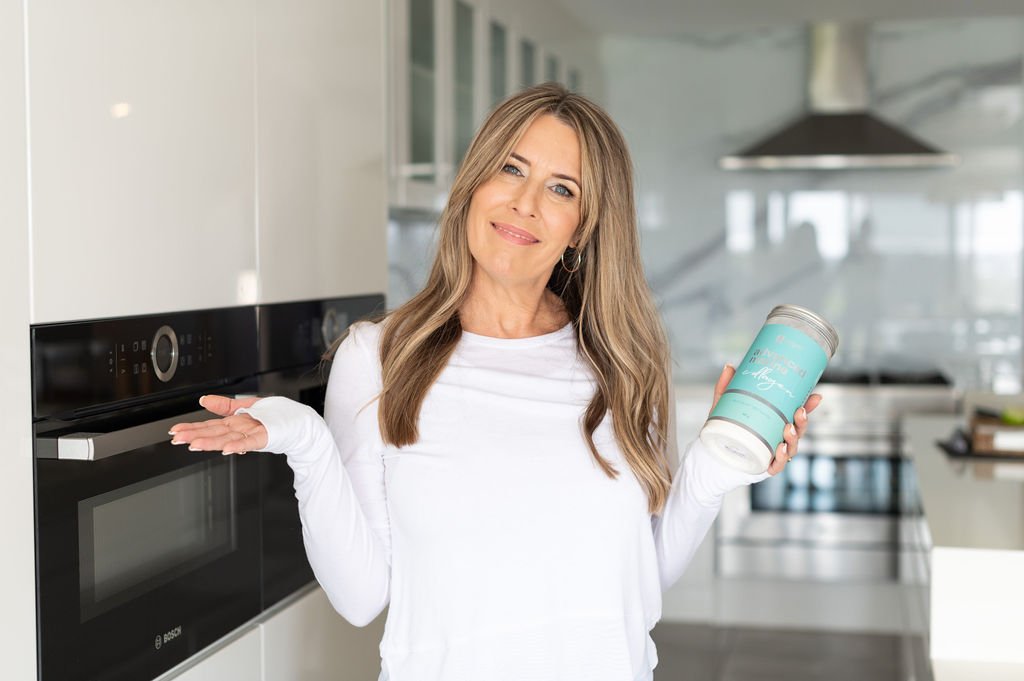
Are you wondering how to give your collagen a helping hand? As we age, our collagen declines, contributing to the more visible signs of ageing such as wrinkles and reduced elasticity. But you do have options to support your collagen levels – and no, it’s not with an expensive skin cream!
What is collagen?
Collagen is the most abundant protein in the human body. It is composed of what we refer to as essential amino acids – meaning amino acids we have to consume through the diet as our bodies can’t make them.
There are different types of collagen found throughout the body, including:
-
Skin
-
Bones and joints
-
Corneas of the eyes
-
Blood vessels
-
Organs including the lungs, liver and kidneys
The skin contains around 40% of our total body collagen, which is why collagen is often referred to when it comes to skincare products and treatments.
COLLAGEN IN BEAUTY PRODUCTS
Collagen is a big focus of the beauty industry and anti-ageing in general. You may even be using a face cream with collagen in it. Unfortunately, this is ineffective – you can’t actually absorb collagen through the skin, as the molecule is too big to cross over into the body! The only way you can get collagen into your system is by ingesting it.
Should I take a collagen supplement?
Right now, the jury is still out when it comes to the impact of taking collagen orally. There are some studies that suggest collagen supplements could improve skin elasticity, reduce wrinkles and increase hydration of the skin. But the research is still in the early stages, and many of the studies are done by collagen companies (so they may not be 100% unbiased!)
There’s certainly nothing wrong with using a collagen supplement – it is a good source of several essential amino acids. In fact, it may be useful for those who don’t consume many animal products to get in their glycine, proline and hydroxyproline (some of the building blocks for collagen). And studies into collagen supplements have not found any negative side effects.
But what may be more beneficial is supporting your body’s own collagen production.
HOW TO SUPPORT YOUR OWN COLLAGEN PRODUCTION
So how do we encourage collagen production? This comes down to ensuring your body has everything it needs to form collagen. Along with the amino acids I mentioned earlier, your collagen cofactors include:
-
Vitamin C
-
Zinc
-
Vitamin B5
In fact, that’s a big part of why I included these nutrients and more in my healthy ageing supplement, Energy Glow NR. It contains ingredients specifically to maintain skin integrity & structure, support skin repair and overall skin health – plus so much more. You can learn more about Energy Glow NR here.
Other simple ways to support your collagen include:
Be sun-smart and use SPF on the face, neck and décolletage. UV exposure from the sun creates a less organised collagen structure, leading to the formation of wrinkles and a reduction in elasticity.
Eat plenty of fruit and veg. These contain vitamin C, as well as antioxidants that help to protect your skin and promote collagen production. Aim for a rainbow of colours – this gives you a broader spectrum of antioxidants and nutrients.
Get your beauty sleep. No, it’s not just a saying – sleep is when your body is busy making new collagen. So if you’re not getting plenty of rest, you don’t get the chance to restore collagen levels.
DREAMING THAT YOU COULD TURN BACK THE CLOCK FOR YOUR SKIN AND YOUR BODY?
While the passing of time is inevitable, it’s possible to look AND feel young and vibrant again. To learn how this is possible, book yourself a FREE Anti-Ageing Strategy call here.

Susie Garden
I help women feeling stressed, flat and older than they’d like regain their youthful energy and glow using a proven method so their natural beauty and confidence shines through.
